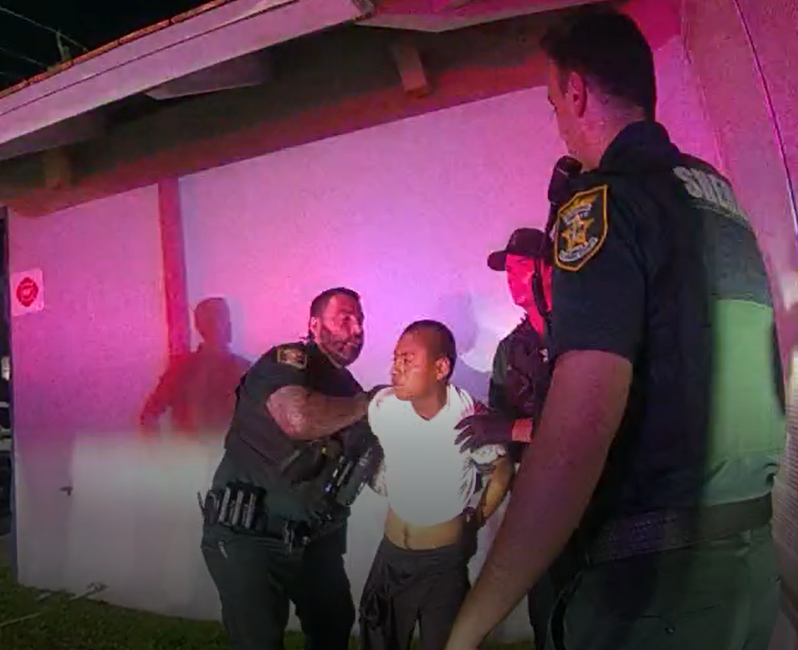News never stops, but sometimes we stop remembering it.
Even subjects we really thought were important, whether that’s school closings or public safety or pride displays, can fall off the mind’s radar when the rest of life crowds in.
But remembering them can be fun.
As the days dwindle to hours remaining in this year, here are reminders of some of the news around Jacksonville in 2024 that caught people’s eye, at least for a while.
Jacksonville’s 30-year stadium deal with Jaguars
The Jaguars took big steps toward staying DTWD when the team, City Hall and the National Football League approved a $1.4 billion stadium lease deal keeping Jacksonville an NFL city for the next 30 years.
The agreement negotiated by Mayor Donna Deegan’s office obligated taxpayers to spend $775 million for a roof-covered, fully overhauled “stadium of the future” to open in time for the 2028 season.
Shown is one of several artist renderings created in 2023 for the renovations to EverBank Stadium, which will be remade with a roof and many modifications under a $1.4 billion 30-year lease deal between the city and the Jaguars.
The deal also requires Jaguars owner Shad Khan to pay another $625 million and be responsible for any cost overruns on the stadium, which will hold about 63,000 fans, down from 67,838 now.
The agreement, which won council passage in June and approval by NFL owners in October, lays out financial terms to keep the Jaguars in town through the stadium lease’s 30-year term.
The team would have to completely repay the city for taxpayer contributions to the project if it moved during the lease’s first 14 years. The repayment price would fall to 75% in the fifteenth year, then drop by 5% each year thereafter.
Construction could start as soon as early 2025, not long after this year’s NFL season is over. The Jaguars plan to continue playing at EverBank Stadium in 2025 and 2026, although in 2026 capacity will shrink to about 43,500.
The stadium will be out of service in 2027 and the team’s home for that year hasn’t been settled. The Jaguars are expected to take plans for that year to the NFL owners’ 2025 meeting for approval.
Former JEA CEO facing prison (soon) over ‘largest fraud in Jacksonville history’
Former JEA CEO Aaron Zahn’s public fall from executive power became a slide toward prison this year, although he hasn’t gotten there yet.
Six years after the investor and novice JEA board member became the surprise pick to lead the city-owned water and power utility, a federal jury in March convicted Zahn of conspiracy and wire fraud for his part in creating an employee incentive plan that could have sucked hundreds of millions of dollars from proceeds of a failed attempt to sell the utility to outside owners. JEA’s board fired Zahn in 2020.
A separate jury acquitted the utility’s former chief financial officer, Ryan Wannemacher, of the same charges, which, like the incentive plan, grew out of a privatization campaign a JEA lawsuit called “perhaps the largest fraud in Jacksonville history.”
As Wannemacher restarted his career by becoming treasurer of a West Virginia-based utility company, Senior U.S District Judge Brian Davis said Zahn deserved four years in prison.
“When deceit and greed intersect, crimes like yours result,” Davis said at Zahn’s sentencing in July.
Punishing effects of hurricanes have kept Zahn out of prison so far, however.
Days before the fallen executive was scheduled to start serving his time, Davis approved an extension because Zahn’s Tampa-area home had been badly flooded by Hurricane Helene, then smashed open by a tree that took down part of a wall during Hurricane Milton, leaving Zahn trying to make the home habitable again for his emergency-physician wife and three young kids. The judge told Zahn to report to prison by Jan. 27.
Hurricane season brings near-misses, again
While communities across the state and the Southeast suffered dramatically more, Jacksonville was roughed up in places by the glancing impacts of Hurricanes Helene and Milton.
About 300,000 homes and businesses lost power from JEA at some point during Helene’s dash across Florida in late September, leaving utility crews scrambling to restore service even as other areas went dark. Almost all power was restored within three days, though.
When Milton pummeled the state less than two weeks later, Florida Power & Light reported more than a third of its customers in Putnam County lost power and nearly as large a share in St. Johns County.
Milton’s rains and storm surge inundated parts of Northeast Florida also, especially southern St. Johns County near the St. Johns River and in perennially vulnerable St. Augustine.
Local concerns faded fast when people saw stunning damage in areas from Tampa and Sarasota on the Gulf of Mexico to tornado-battered Atlantic coast neighborhoods around Fort Pierce and Port St. Lucie.
“I am just absolutely beyond grateful that we continue to be so blessed in this city that we have yet again avoided the worst of one of these monster storms,” Mayor Donna Deegan said after Milton blew past.
RISE Doro apartments burn down; new start ahead?
Days before the first residents were expected to move in, fire destroyed the eight-story RISE Doro apartment complex billed as a “transformative project” for downtown’s sports and entertainment district.
The 247-unit complex built on the former site of a disused fixture-manufacturing company was expected to inject people and activity into the area when the football, baseball and hockey venues in eyeshot of the building were closed.
The complex at East Adams Street and A. Philip Randolph Boulevard was built with sprinklers that weren’t been turned on when the fire started Jan. 28, although they were scheduled for a pressure test the following week.
The project, once projected to cost about $46 million, was scheduled to formally open March 1, but managers had agreed to let some residents move in early as long as the sprinklers had passed inspection.
Instead, a demolition crew started work Feb. 2 tearing down the building where flames had spread from the sixth to seventh floors. The roof was damaged as the three-alarm fire burned through the night, creating concerns that some compromised walls might simply collapse toward the streets below.
The building was a total loss, but hope for the site’s future still found a way to rekindle.
In September, Jacksonville’s City Council approved a $15.45 million incentives package to encourage an arm of Jacksonville-based RISE: A Real Estate Company to build back the project one more time.
Duval schools hit closings quandary, budget cliff
Neighborhoods around dozens of Duval County schools spent months obsessing over whether their local schools would be closed to save money after a consultant suggested dozens of possible closings in March.
Only three schools ― Annie R. Morgan, Kings Trail and Susie Tolbert elementaries ― were finally approved in November to shut down at the end of this school year and two other closings had been approved separately.
Action that could retire three more schools might wait as late as August 2026, the board decided, but a new school district policy requires the board to reopen the subject every year.
Before the newest closings had been finalized, though, the school district had cut about 400 teachers from its current budget and new Superintendent Christopher Bernier had highlighted the need to “stop dipping into our savings account” as the district’s finance chief warned of a “high probability” that savings could fall below a state-mandated safety threshold.
Bernier has talked about the need to avoid a $100 million shortfall in the 2025-26 budget year, which starts July 1.
Saving big sums without big job cuts could be tough, however.
“When 85% of your money or more is in salaries,” Bernier told the School Board in July, not cutting costs elsewhere would mean “the only place we’ll have to turn … is to our people.”

A rendering presented during a University of Florida board meeting shows what a graduate campus built near the Prime Osborn Convention Center could look like in downtown Jacksonville.
UF graduate campus coming to LaVilla
The idea simmered in the background for more than a year, but the University of Florida’s decision this month to locate a $300 million graduate campus around Jacksonville’s Prime Osborn Convention Center promises benefits that could impact downtown and the city’s academic and business worlds into the 2030s, maybe longer.
“UF has a bold vision for our campus in Jacksonville,” university board Chairman Mori Hosseini said. “This will be a site that will give our students an opportunity to learn and thrive in a fast-growing city with incredible job opportunities. Our goal is to create a national center of excellence and to bring our bright students to this forward-thinking city.”
The center has been considered for roles in learning and research around 10 graduate degrees offered by UF’s colleges of business, engineering, law, health sciences, and design, construction and planning. Partnerships with Jacksonville businesses could also give the Jacksonville campus opportunities to apply research in real-world settings.
The new Florida Semiconductor Institute will also be part of the campus. The state has already put up $80 million for the institute for research and development of semiconductor chips whose next generation will be essential to items ranging from consumer electronics to space and defense technology.
UF will be working with Mayor Donna Deegan’s office on developing a 22-acre LaVilla campus that Deegan said will put Jacksonville “on the cutting edge of workforce development” and accelerate the growth of downtown.
Lighting the way to welcome Pride Month
Plans to mark Pride Month in June with rainbow hues lighting Jacksonville’s Acosta Bridge were derailed when the Florida Department of Transportation decided lights on its bridges should be red, white and blue for what Gov. Ron DeSantis touted as Freedom Summer.
But LGBTQ advocates and their supporters found a DIY way to welcome the month and continue their celebration, which had been done for the previous three years.
To cheers from a crowd on the Southbank Riverwalk, on the Friday night that fell on May 31, about 70 people took positions on the pedestrian walkway of the Main Street bridge, just downstream from the Acosta, and activated flashlights with colored filters to bathe the bridge in the rainbow sequence they had wanted.
“I thought it came off great,” Jacksonville resident Matt McAllister, who helped organize the event, told the Times-Union that night. “… If this is about freedom, let’s go exercise our freedom, and that’s what is so special about what we did tonight.”

St. Johns County deputies arrest Virgilio Aguilar Mendez, 18, after resisting Sgt. Michael Kunovich, who deemed him suspicious outside the Super 8 Motel on May 19, 2023. Kunovich, 52, would later collapse and die after a brief tussle trying to detain the immigrant worker.
Case dismissed against immigrant charged in St. Johns County officer’s death
A teenage immigrant once charged with killing a St. Johns County lawman had his charges dismissed in March after the case drew wide-reaching criticism that included 600,000 petition signatures seeking his freedom.
Virgilio Aguilar Mendez, 19, had struggled with deputies in 2023 after Sgt. Michael Kunovich questioned him and tried to search him while Aguilar Mendez was eating outside the Super 8 hotel where the Guatemalan farm laborer was staying.
Aguilar Mendez spoke Mam, an indigenous Mayan language, but struggled to understand or be understood by Kunovich, who died of a heart attack not long after the teen was handcuffed.
The 52-year-old sergeant’s death led to Aguilar Mendez being charged with aggravated manslaughter but a judge later ruled the teen was incompetent to stand trial after a 60-day period for establishing the teen’s competency ended without success.

Federal prosecutors filed these photos of Amit Patel on a 2022 trip to Miami for a Formula 1 race before he was sentenced to prison for stealing about $22 million from the Jacksonville Jaguars, his former employer.
Ex-Jaguars embezzler imprisoned for fraud to pay gambling debts, sues FanDuel for $250 million
Amit Patel, who was a finance manager for the Jaguars until 2023, pleaded guilty late that year to embezzling $22 million from his ex-employer.
He spent 2024 proving that court stories don’t end when the verdict comes in.
Patel, now 32, was sentenced in March to six and a half years in prison, a term he’s serving in South Carolina while separate court fights about his theft unfold in Jacksonville and New York.
In July, the Jaguars sued Patel for almost $67 million, saying Florida law entitles the team to recover three times the amount stolen by the ex-employee, a self-described gambling addict who enjoyed ritzy excursions but lost huge sums in online wagers.
Patel has challenged parts of the team’s lawsuit and last month argued through his lawyer last month that the team is trying to recover more than it’s entitled to. He also argued that he was afflicted with a severe gambling disorder and that “his actions were neither knowing nor intentional.”
Patel has also argued he was wronged, filing a $250 million federal lawsuit in October against the online betting site FanDuel and companies connected to it.
Patel’s lawsuit suit said FanDuel assigned him a VIP host who was sometimes in touch with him 100 times a day, who traveled with Patel to special events and who must have known Patel worked for the Jaguars and wasn’t allowed under his work’s rules to gamble on the NFL.
Both cases are still pending.
Is city taking a respite from homicides?
With almost no fanfare, Jacksonville officials have been headed throughout the year toward a welcome rarity: a year with fewer than 100 homicides in a community historically derided as “the murder capital of Florida.”
At the least, the count of killings appears to be lower than it has been in the previous five years, when unofficial Times-Union data tallied the yearly tolls as ranging from 129 to 177 homicides. The newspaper recorded 157 homicides last year.
Jacksonville hasn’t stayed below the 100-homicide mark since 2011, when 86 killings were logged.
If the pace remains low ― and individual incidents can cause hug changes ― this could be only the third time in 21 years of record-keeping by the Times-Union that the yearly total hasn’t reached 100.
This article originally appeared on Florida Times-Union: Remember these 2024 stories in Jacksonville? How could you forget?
Read the full article here
